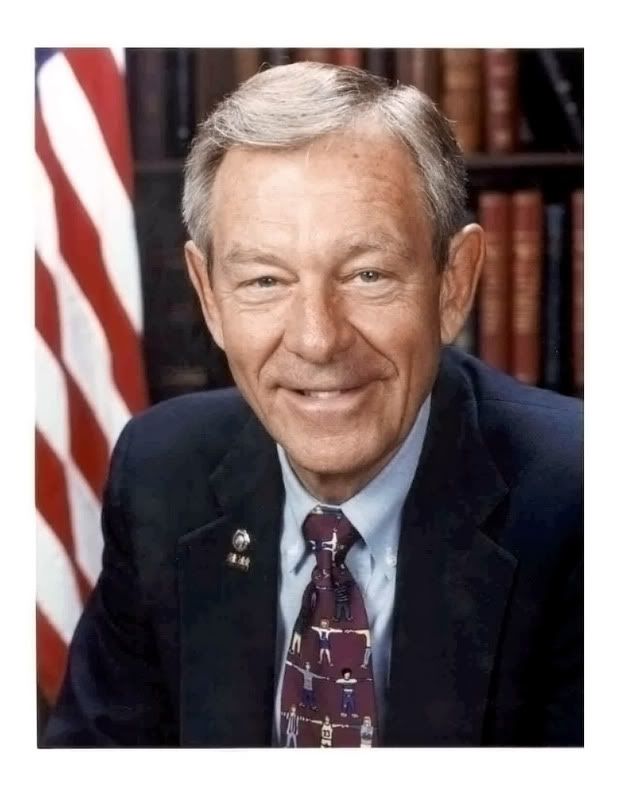A hopeful sign

FOR IMMEDIATE RELEASE:
December 7, 2006
SEN. VOINOVICH INTRODUCES VISA WAIVER LEGISLATION FOR NATIONS COOPERATING WITH WAR ON TERROR
WASHINGTON, D.C. – U.S. Senator George V. Voinovich (R-OH), a member of the Foreign Relations Committee and the Homeland Security and Governmental Affairs Committee, today introduced legislation that would extend visa-free travel privileges to our allies in the Global War on Terror.
The Secure Travel and Counterterrorism Partnership Act of 2006 would improve cooperation with key allies while strengthening U.S. national security interests and promoting U.S. economic competitiveness. Sen. Richard Lugar (R-IN), chairman of the Foreign Relations Committee, Sen. Daniel Akaka (D-HI), Sen. Barbara Mikulski (D-MD) and Sen. Rick Santorum (R-PA) are original co-sponsors of the bill.
“There are many countries helping us thwart terrorism around the world and they should be rewarded for their continued cooperation,” Sen. Voinovich said. “This legislation will improve both our national security and economic interests while helping to solidify these relationships and improve good will toward the United States for years to come. I will work closely with the administration and my colleagues in the Senate as we move forward to show our allies that we appreciate their help in this historic fight.”
Sen. Voinovich’s legislation authorizes the Department of Homeland Security, in consultation with the Department of State, to expand the Visa Waiver Program (VWP) to countries that support the United States and are prepared to do everything in their power to help keep terrorists from crossing our borders.
“I believe this bill effectively demonstrates Congressional concern yet does not seek to dictate to the Administration which of our strategic partners should be included in the program,” Sen. Lugar said. “Such compromises are the hallmark of good legislation, and I look forward to seeing this bill signed into law.”
Sen. Akaka said: “This bill will enable the United States to validate its affinity with those nations that share America’s hopes for a better and peaceful future while contributing to our mutual economic well being.”
“I have fought for years to expand the VWP so our allies can visit family and conduct business in the United States without standing in line to get a visa,” said Sen. Mikulski. “We know that our borders will be no less secure because of these visitors. But we know that our alliance will be more secure because of this legislation.”
Sen. Voinovich believes that expanding the VWP will bring clear benefits for our immediate and long-term national security interests. The countries would be eligible to participate in the program only after the executive branch certifies that they do not pose a security or law enforcement threat to the United States.
All participants would be required to implement enhanced travel security requirements, negotiate new agreements on counterterrorism cooperation and critical information-sharing and further demonstrate their close cooperation with the United States in the Global War on Terror. The legislation would also require the U.S. government to report to Congress on its plans for further enhancing security standards for existing VWP countries.
“In addition to promoting U.S. national security interests, my bill will increase business ties and tourism, benefiting our economy and competitiveness for years to come,” Sen. Voinovich said. “This is not only a sign of gratitude but a smart move that will advance America’s strategic interests.”
The VWP was established in 1986 to improve relations with U.S. allies and benefit the U.S. economy. The program permitted nationals from selected countries to enter the United States for tourism or business without a visa for up to 90 days. Currently, 27 countries participate in the program.
Although numerous countries have expressed a desire to participate in the VWP, and a willingness to cooperate with the necessary security requirements, no new countries have been admitted since 1999. President Bush recently called on Congress to expand the VWP to deserving nations, and has previously identified 13 “Road Map” countries as potential candidates for future participation. These include Bulgaria, Cyprus, Czech Republic, Estonia, Greece, Hungary, Latvia, Lithuania, Malta, Poland, Romania, Slovakia and South Korea.
more














3 Comments:
I wouldn't be buying tickets to the U.S. just yet. Most of the bills introduced in Congress never make it beyond that step. You'd be lucky if this one makes it to committee. They're usually for local consumption, and here we have a senator from a state with quite large East European communities. And it's a Republican in a Congress that will soon be in the hands of the Democrats. So, don't hold your breath...
Fair enough Chris, but there's a reason I posted this.
At least once a year there is a bill introduced to Congress which proposes adding Poland to the VWP, this is at least the second I can remember this year.
But there are some reasons to see this bill differently.
Firstly, at the recent NATO meeting in Riga, Bush very clearly set a new policy goal of changing the VWP to allow more allies, like Poland in. So this bill is different in that it has the backing of the President behind it. In my opinion, that gives this bill a much bigger chance.
"I am pleased to announce that I am going to work with our Congress and our international partners to modify our Visa Waiver Program," Bush told a news conference on the eve of a NATO summit in neighboring Latvia. "It's a way to make sure that nations like Estonia qualify more quickly for the program and at the same time strengthen the program's security components," he added.
I read this bill as a direct result of this policy move.
Secondly, this bill is bi-partisan (three Republicans and two Democrats are co-sponsors). As you say, this Republican Congress will soon be Democratic - which in my opinion already gives this bill a much better shot. Republicans generally quashed such bills on immigration or security grounds. Democrats in general have been much more supportive of allowing Central European allies - and Poland in particular - into the VWP.
Speaking of the politics behind the bill, you say that such measures are normally for local consumption. Ohio may have a "quite large" Eastern European community, but it's interesting that it wasn't a New York, Illinois, or Michigan politician who introduced this bill. And Senator Akaka of Hawaii? How big is the Eastern European community there?
This bill certainly has a long way to go before it becomes law - but there are several reasons to believe that it is different from the previous ones. Which is why I think its introduction constitutes "a hopeful sign".
From Warsaw Business Journal:
Visa victory?
George W Bush has announced that he is working to make travel to the US easier for CEE citizens.
During a visit to Estonia, US president George W Bush promised to work to modify his country's Visa Waiver Program to make it easier for citizens of Central and Eastern European (CEE) countries to visit the US visa-free.
"I am pleased to announce that I am going to work with our Congress and our international partners to modify our Visa Waiver Program," Bush told a news conference on the eve of a NATO summit in neighboring Latvia. "It's a way to make sure that nations like Estonia qualify more quickly for the program and at the same time strengthen the program's security components," he added.
Several CEE countries, and Poland in particular, have long pressured the US to ease the restrictions within the program so that they could be included. With the exception of Greece, all of the "old" EU member states are included in the program. Of the 10 members which joined in 2004, only Slovenia has qualified.
Many Poles believe it is unfair that while US citizens can visit Poland for up to 90 days visa-free, Poles must go through a rigorous and sometimes humiliating vetting process before being granted a visa to visit the US. Polish diplomats have also pointed out that Poland is one of the US' closest allies in Europe, sending troops to Iraq to help with the US' mission there. The Czech Republic, Estonia, Hungary, Latvia and Slovakia have also sent troops to Iraq.
According to US law, visas may only be waived when a country has a low rate of visa overstays and a visa-refusal rate below three percent. Bush said the process to ease these restrictions would begin soon, and would probably involve a change to the three-percent threshold. (Reuters)
Post a Comment
< Main